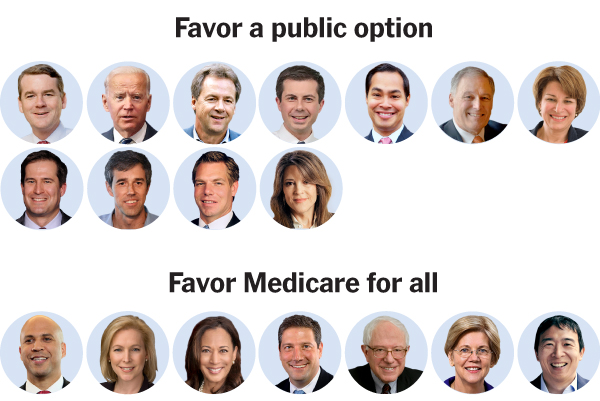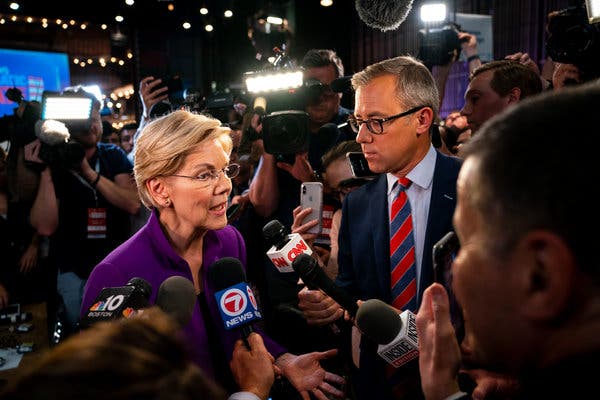WASHINGTON — It was a command as much as a question, intended to put an end to months of equivocating and obfuscating on the issue: Which of the Democratic presidential candidates on the debate stage supported abolishing private health insurance in favor of a single government-run plan? Show of hands, please.
Just four arms went up over the two nights — Senator Elizabeth Warren of Massachusetts and Mayor Bill de Blasio of New York on Wednesday, and Senators Bernie Sanders of Vermont and Kamala Harris of California on Thursday — even though three candidates who kept their hands at their sides have signed onto bills in Congress that would do exactly that.
And after the debate, Ms. Harris said that she had misunderstood the question, suggesting she had not meant to raise her hand either.
The response, and ensuing confusion, reflected one of the deepest fault lines among Democrats heading into 2020 — on an issue the party hopes to use as a cudgel against President Trump as effectively as it did last fall, when their vow to protect the Affordable Care Act helped them recapture the House.
Though Democrats owned the health care issue in 2018, pointing a way forward — tear up the current system and start over or build on gains in coverage and care that the Obama health law achieved — is proving tricky for the party’s presidential candidates.
The challenge is to avoid alienating both the progressives, whose support they will need in the primary, and the more moderate voters, without whom they cannot survive the general election.

In shooting up her hand and saying, “I’m with Bernie,” Ms. Warren seemed to have made the calculation that proving herself as unequivocal as Mr. Sanders in the quest for universal government-run health insurance was crucial to building the left-wing support she needs, including from some of his loyalists.
During the early months of the Democratic primary race, Ms. Warren has gained attention with her steady stream of detailed policy plans on a variety of subjects. But before Wednesday’s debate, she had been less than crystal clear about how she would expand access to health care — and particularly on the role that private insurers should play under the type of Medicare-for-all system that she is calling for.
“I think lots of progressives were very happy to see her clarify her position,” said Waleed Shahid, the communications director for Justice Democrats, a group that seeks to elect progressive House candidates.
[Read our story about what might happen if we got rid of private health insurance.]
Ms. Harris had more overtly waffled on the future of private insurance before the debates, yet raised her hand just as quickly as Mr. Sanders when one of the moderators asked who favored abolishing it.
After the debate, she immediately walked it back, saying she understood the question to be asking whether she would give up her own private insurance.
Asked point-blank on MSNBC’s “Morning Joe” on Friday morning whether she believed that private insurance should be eliminated in the United States, Ms. Harris responded, “No.”
“I am a proponent of ‘Medicare for all,’” she said. “Private insurance will exist for supplemental coverage.” Mr. Sanders’s Medicare for All Act, which she co-sponsored, would allow private coverage for elective procedures, like cosmetic surgery, not covered by the government plan.
John Delaney, a former Maryland congressman who is also seeking the Democratic presidential nomination, is taking every possible opportunity to warn that the party is at risk of turning health care from a winning issue into a liability.
“We won on health care in 2018, and if we go down the path with Medicare for all, we’ll lose on it in 2020,” he said in an interview. “Right now, about half of our citizens have private insurance and most of them like it. And you just can’t win elections on taking something away from the American people that they like. It’s just not common sense.”
Ironically, support for universal government-run health insurance could provoke the same counterattack from Republicans that the Democrats used so potently after the Trump administration tried to repeal and replace the Affordable Care Act.
“Trump and the Republicans will spend a billion dollars telling the American people that the Democrats want to take away your health insurance,” Mr. Delaney said, “and he would be correct.”
Mr. Trump appears to be adopting just such a strategy. In a recent Rose Garden appearance, he warned that more than 120 Democrats had co-sponsored Mr. Sanders’s Medicare for All bill — a “massive government takeover of health care,” as he put it — that would expand Medicare to cover all Americans, make the program’s benefits more generous and eliminate most deductibles and co-payments.
“That’s going to hurt a lot of people,” Mr. Trump said. “Their plan would eliminate Medicare as we know it and terminate the private health insurance of 180 million Americans.”
Remaining imprecise on the issue could have been a vulnerability for Ms. Warren in particular as she tries to compete with Mr. Sanders. “Elizabeth Warren Has a Plan for Everything — Except Health Care,” read the headline of a recent article published by Jacobin, the socialist magazine.
But the move would create new risks if she were to become the Democratic nominee.

CreditDoug Mills/The New York Times
“She didn’t have to fall into that trap,” said Paul Starr, a professor of sociology and public affairs at Princeton who was a health policy adviser in the Clinton White House.
Not only would abolishing private insurance disrupt coverage for many people who are satisfied with their private coverage, Mr. Starr said, but generating the revenue needed to finance a single-payer health care system “would be just an overwhelming political task.”
“If in coming weeks and months it’s that raising of the hand that gets replayed again and again, then I think it’s going to damage her,” he said.
With Mr. Trump and his surrogates likely to step up their attack in the coming months, it was not particularly surprising to hear most of the Democrats walk a more cautious line — even the ones who have co-sponsored Mr. Sanders’s single-payer bill or a House version that would, in fact, put everyone into government-run coverage: Senator Cory Booker of New Jersey, Senator Kirsten Gillibrand of New York and Representative Tulsi Gabbard of Hawaii.
All three were more vague when questioned about eliminating private insurance. Mr. Booker said he favored keeping it but did not explain why and Ms. Gabbard said merely that it deserved “some form of a role.”
Many candidates — including some who say their ultimate goal is a government-run system — support a system in which people would have the option to buy into Medicare or a similar public insurance program, but private insurers could still compete for their business.
Ms. Gillibrand was eager to point out that she had written the portion of the Sanders bill allowing four years for Americans to transition to their new government coverage by providing such a choice.
“I believe we need to get to universal health care as a right and not a privilege — to single payer,” Ms. Gillibrand said. “The quickest way you get there is you create competition with the insurers. God bless the insurers. If they want to compete, they can certainly try.”
More likely, though, she contended, is that “people will choose Medicare, you will transition, we will get to Medicare for all.”
The hesitancy to fully embrace the abolition of private insurance isn’t surprising considering the polling on the issue, which has consistently found that support for Medicare for all drops off quickly when voters are told it would eliminate their private, employer-provided plans and most likely raise taxes.
The poll results also help explain why so many candidates — including former Vice President Joseph R. Biden Jr., Senator Michael Bennet of Colorado, Mayor Pete Buttigieg of South Bend, Ind., Gov. Jay Inslee of Washington, Senator Amy Klobuchar of Minnesota and former Representative Beto O’Rourke of Texas — say they would keep private insurance but add a “public option” to buy coverage in a government-run health plan that would create competition and potentially drive down prices.
Some candidates support bills that would allow people who do not get insurance through a job, or those 50 and older, to pay a premium to buy a Medicare plan that would be the same as what is now available to people 65 and older. Others prefer the idea of setting up a new public plan, run by the government, that anyone could buy — a “Medicare-for-all-who-want-it” approach.
Mr. Buttigieg used that very phrase on Thursday and suggested he was fine with keeping private insurance for everything but the most basic care.
“Let’s remember,” he said, “even in countries that have outright socialized medicine — like England — even there, there’s still a private sector. That’s fine. It’s just that for our primary care, we can’t be relying on the tender mercies of the corporate system.”
Mr. Biden noted that creating a public option to compete with private insurance could be done much quicker than a complete overhaul of the health care system.
“Urgency matters,” Mr. Biden said, referring to people like his son Beau, who was given a terminal cancer diagnosis after returning from military duty in Iraq. “We must move now.”

